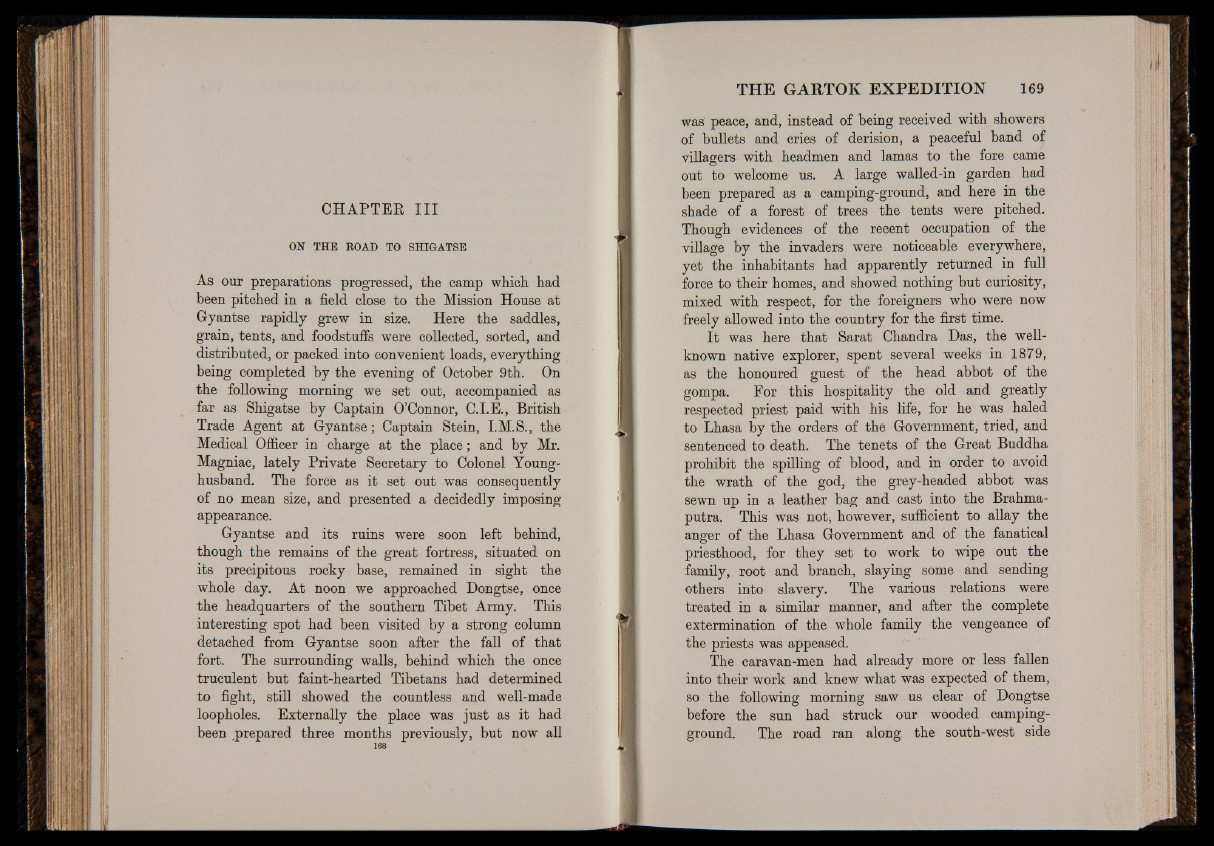
CHAPTER I I I
ON THE ROAD TO SHIGATSE
As our preparations progressed, the camp which had
been pitched in a field close to the Mission House at
Gyantse rapidly grew in size. Here the saddles,
grain, tents, and foodstuffs were collected, sorted, and
distributed, or packed into convenient loads, everything
being completed by the evening of October 9th. On
the following morning we set out, accompanied as
far as Shigatse by Captain O’Connor, C.I.E., British
Trade Agent at Gyantse; Captain Stein, I.M.S., the
Medical Officer in charge at the place; and by Mr.
Magniac, lately Private Secretary to Colonel Young-
husband. The force as it set out was consequently
of no mean size, and presented a decidedly imposing
appearance.
Gyantse and its ruins were soon left behind,
though the remains of the great fortress, situated on
its precipitous rocky base, remained in sight the
whole day. At noon we approached Dongtse, once
the headquarters of the southern Tibet Army. This
interesting spot had been visited by a strong column
detached from Gyantse soon after the fall of that
fort. The surrounding walls, behind which the once
truculent but faint-hearted Tibetans had determined
to fight, still showed the countless and well-made
loopholes. Externally the place was just as it had
been .prepared three months previously, but now all
was peace, and, instead of being received with showers
of bullets and cries of derision, a peaceful band of
villagers with headmen and lamas to the fore came
out to welcome us. A large walled-in garden had
been prepared as a camping-ground, and here in the
shade of a forest of trees the tents were pitched.
Though evidences of the recent occupation of the
village by the invaders were noticeable everywhere,
yet the inhabitants had apparently returned in full
force to their homes, and showed nothing but curiosity,
mixed with respect, for the foreigners who were now
freely allowed into the country for the first time.
It was here that Sarat Chandra Das, the well-
known native explorer, spent several weeks in 1879,
as the honoured guest of the head abbot of the
gompa. For this hospitality the old and greatly
respected priest paid with his life, for he was haled
to Lhasa by the orders of the Government, tried, and
sentenced to death. The tenets of the Great Buddha
prohibit the spilling of blood, and in order to avoid
the wrath of the god, the grey-headed abbot was
sewn up in a leather bag and cast into the Brahmaputra.
This was not, however, sufficient to allay the
anger of the Lhasa Government and of the fanatical
priesthood, for they set to work to wipe out the
family, root and branch, slaying some and sending
others into slavery. The various relations were
treated in a similar manner, and after the complete
extermination of the whole family the vengeance of
the priests was appeased.
The caravan-men had already more or less fallen
into their work and knew what was expected of them,
so the following morning saw us clear of Dongtse
before the sun had struck our wooded camping-
ground. The road ran along the south-west side